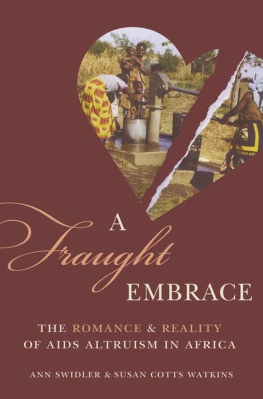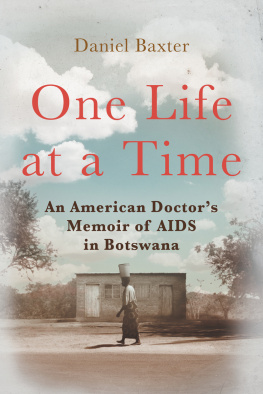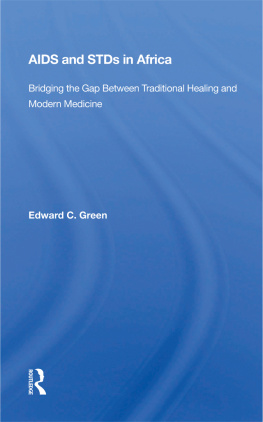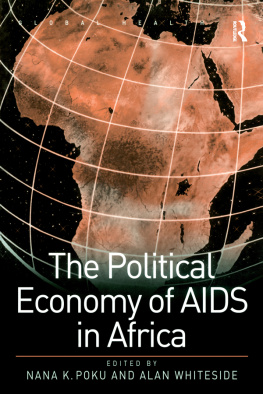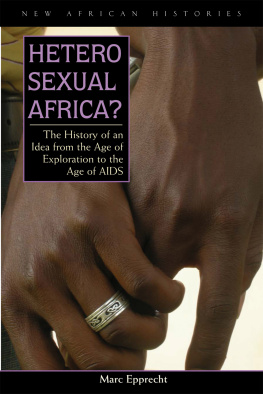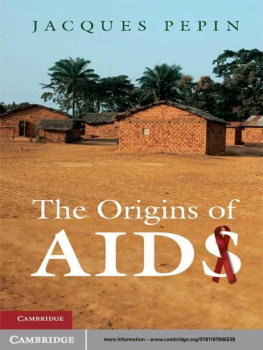
A Fraught Embrace

| PRINCETON STUDIES IN CULTURAL SOCIOLOGY Paul J. DiMaggio, Michle Lamont, Robert J. Wuthnow, and Viviana A. Zelizer, Series Editors |
A list of titles in this series appears at the back of the book |
A FRAUGHT EMBRACE
The Romance & Reality of AIDS Altruism in Africa
ANN SWIDLER
SUSAN COTTS WATKINS
Princeton University Press
Princeton and Oxford
Copyright 2017 by Princeton University Press
Published by Princeton University Press, 41 William Street, Princeton, New Jersey 08540
In the United Kingdom: Princeton University Press, 6 Oxford Street, Woodstock, Oxfordshire OX20 1TR
press.princeton.edu
Jacket photograph by Gerald Cotts
All Rights Reserved
Library of Congress Cataloging-in-Publication Data
Names: Swidler, Ann, 1944author. | Watkins, Susan Cotts, 1938author.
Title: A fraught embrace : the romance and reality of AIDS altruism in Africa / Ann Swidler and Susan Cotts Watkins.
Other titles: Princeton studies in cultural sociology.
Description: Princeton : Princeton University Press, 2017. | Series: Princeton studies in cultural sociology | Includes bibliographical references and index.
Identifiers: LCCN 2016039899 | ISBN 9780691173924 (hardcover : alk. paper)
Subjects: LCSH: AIDS (Disease)Malawi. | AIDS (Disease)PatientsServices forMalawi. | HIV infectionsSocial aspectsMalawi. | Non-governmental organizationsMalawi. | Antiretroviral agentsMalawi. | VoluntarismMalawi.
Classification: LCC RA643.86.M3 S95 2017 | DDC 362.1969792096897dc23
LC record available at https://lccn.loc.gov/2016039899
British Library Cataloging-in-Publication Data is available
This book has been composed in Baskerville 10 Pro
Printed on acid-free paper.
Printed in the United States of America
10 9 8 7 6 5 4 3 2 1
CONTENTS
PREFACE
BEGINNING IN THE LATE 1980S, the horror of the AIDS epidemic in Africa called forth an outpouring of compassionand of romantic imagination. Governments in wealthy countries created global organizations to fight the disease; church groups sent volunteers; ordinary people sent checks. There was a ferment of altruism in the Western world inspired by a desire to help others in far-away places. We focus on AIDS as the key motivator of the global altruism we study. But altruists also target other issues, such as poverty and womens empowerment, and embrace other transformative goals. Consequently, our analysis of global altruism widens beyond a focus on AIDS interventions alone.
Much good has come from this altruism. Successful efforts to provide drugs that treat, if not cure, AIDS have extended the lives of millions who would otherwise have died. AIDS altruism, however, also inspired powerful fantasies. Donors in wealthy countries, particularly those hoping to prevent, rather than just treat AIDS, have imagined that they can protect Africans by transforming them. Their fantasies have been reciprocated from the African side. Quests for transformation of both self and others constitute the essence of a romance.
The ferment of AIDS altruism has also brought new opportunities to those whom we call brokerseducated or unusually entrepreneurial Africans who mediate between foreign altruists and local people who are trying to survive the epidemic and care for those who are ill. Some brokers are employees in the many organizations working to transform Africans ways so that they can escape infection. Others are brokers-by-chancelocals who often through an accidental contact assist foreign visitors who have come to help orphans or comfort the stricken.
Western altruists and African brokers enact a romance in another sense too. As in a love story, both long for connection, albeit in different ways. They bring to their encounters their own hopes and dreams, and they often suffer disappointment and heartbreak. Sometimes there is an eventual consummation, if not a perfectly happy ending.
To function in such unfamiliar landscapes as Africas villages or urban slums, both large institutions and individual altruists need local guidesbrokers who can connect them with those whom they would help. However unromantic the term broker may sound, the foreigners dependence on the broker as guide, cultural interpreter, and sometimes friend can make the relationship an emotionally charged one. From their side, brokers dream that someone who has come to fight AIDS will transform their lives. This mutual dependence, given the hopes and fantasies it arouses on both sides, creates a romance that often begins with a rush of infatuation but also can dissolve into disillusionment, disappointment, and even a sense of betrayal.
Coming from different worlds heightens both the excitement of discovery and the dangers of misunderstanding. Altruists who come from afar, however, rarely recognize the brokers fantasies. This book, if it succeeds, should deepen readers understanding of what the romance of AIDS altruism is like from the perspectives of the brokers, who are critical but often ignored actors in the AIDS drama.
We refer to altruists and donors almost interchangeably, although some altruists are volunteers who primarily give their time and effort, and others are institutions that just give money. The individuals who come in person to help and the institutional altruiststhe giant bureaucracies such as USAID or Save the Childrenall depend on publics that are moved to help distant villagers. We use the term villagers to refer to the objects of the donors affections although they may be fishermen or small traders or live in urban slums. Villagers connotes to altruists and brokers poor communities in need of their help. Although villagers draw altruists, large and small, to Africa, most altruists have their deepest direct involvement with a broker. Few villagers ever meet either a donor or a broker, but they too dream that somehow, some day, they will be helped by an altruist from afar.
The intense emotions that draw altruists to Africa are displayed in Western accounts. In 2003, a British newspaper, The Guardian, published Saving Grace, a special supplement about the devastating effects of AIDS in Malawi, focused on Grace Matnanga, a young, HIV-positive (HIV+) woman.
Once she had a husband. Once she had a child. Both are dead.
I was married for eight years, she says. My husband passed away in 1998. He collapsed and was taken to the Central Hospital and put on oxygen. Like most of the young people who die, he had not been tested for HIV, but theres little doubt that Aids killed him.
He survived longer than their little daughter. Tiyajane was born in 1993, the longed-for fulfilment of marriage in Malawian society, where almost every young woman has a baby strapped to her back. Tiyajane appeared to be healthy at first, but then the weight gain slowed. She stopped thriving. She began to get sick. She picked up infections. When she died, aged three, she was a pitiful, wasted scrap, the ulcers in her throat and mouth making the pain of swallowing more vicious than the pangs of hunger.
At the time that Graces daughter was desperately ill, antiretroviral drug treatment (ARVs) had been developed in the West, but was neither widely available nor free in Malawi. The story concludes with the painful unfairness of Graces situation:
If ARVs were available and they were here, I would take them, she says. She is no more indifferent to her life than her contemporary in an up-market shoe shop in Durham or Leeds. Shes just living on the wrong side of the global divide.
Next page
